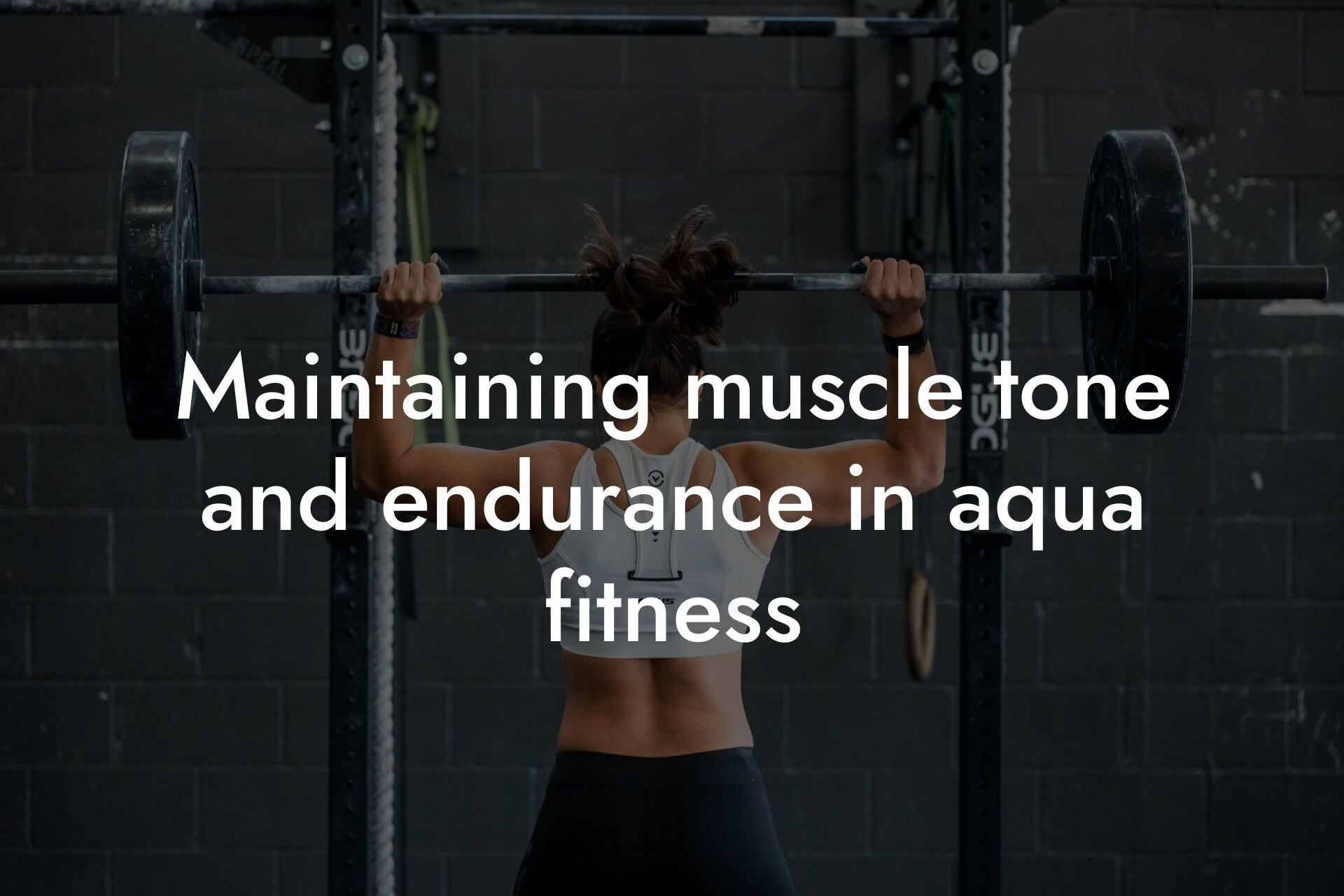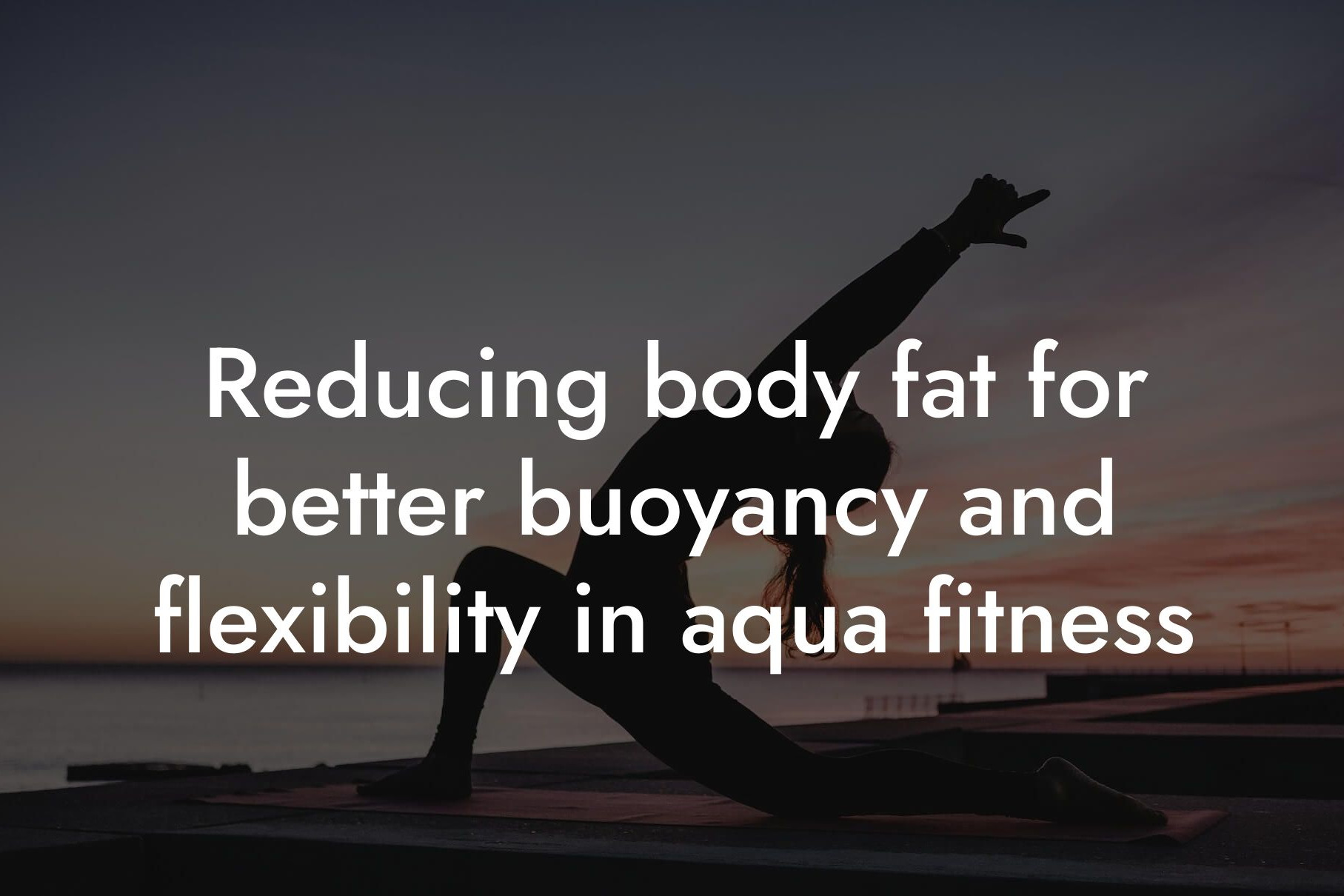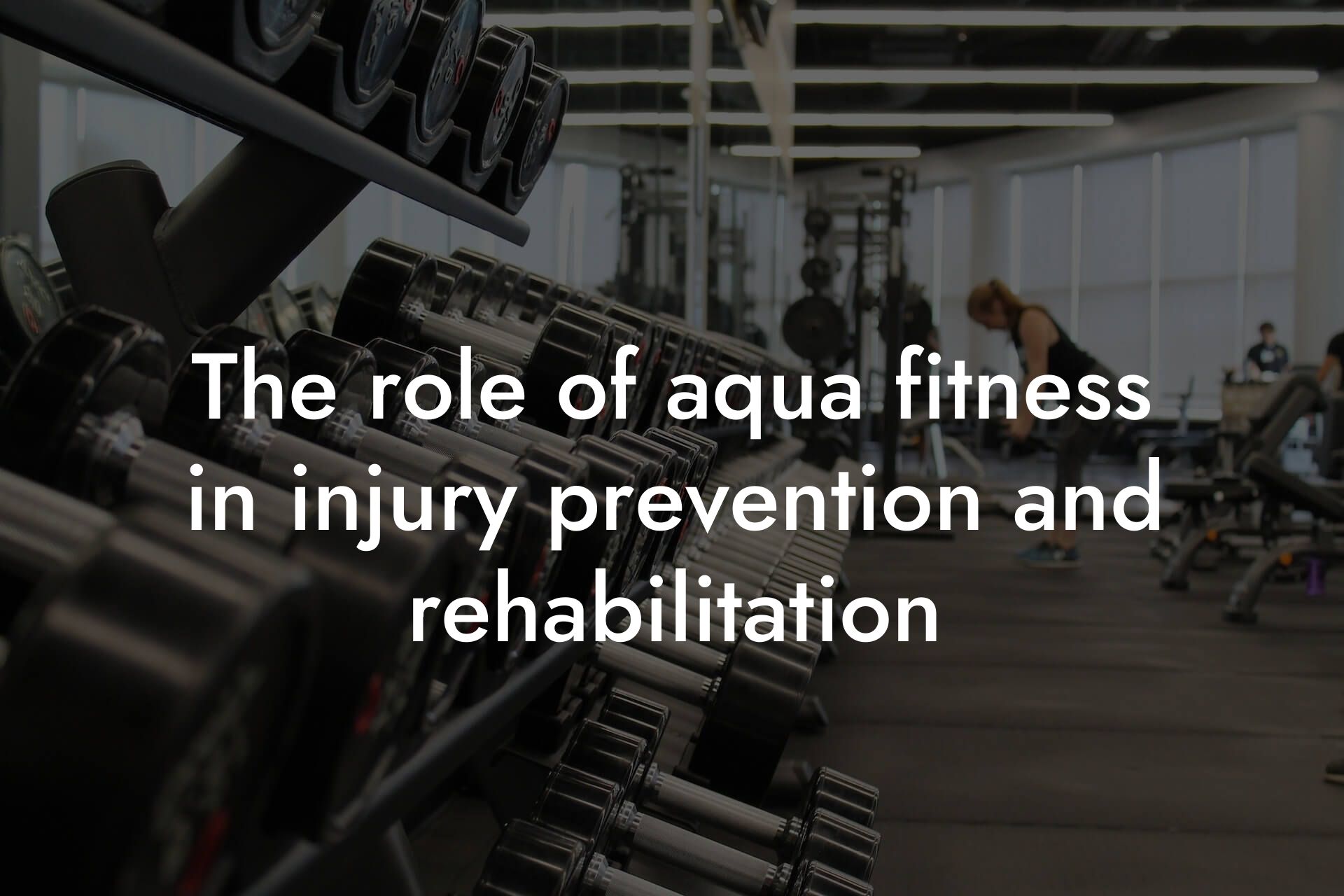As a high-earning professional, you understand the importance of maintaining a healthy and fit physique. Engaging in regular aqua fitness classes is an excellent way to achieve this goal. However, to get the most out of your workouts and maintain sustained energy levels, it's essential to fuel your body with the right nutrients. In this article, we'll provide you with comprehensive nutrition tips to help you power through your aqua fitness classes and achieve your fitness goals.
Table of Contents
Understanding Energy Needs for Aqua Fitness
Aqua fitness classes are a high-intensity workout that requires a significant amount of energy. Water-based exercises engage multiple muscle groups, increasing your heart rate and caloric expenditure. To perform at your best, you need to consume the right amount of energy-rich foods to support your body's demands. Aim to consume a balanced diet that includes complex carbohydrates, lean protein, and healthy fats to provide sustained energy release.
Pre-Workout Nutrition
What you eat before your aqua fitness class can significantly impact your performance. Aim to consume a meal or snack that includes a mix of complex carbohydrates and lean protein 1-2 hours before your workout. This will help to provide a slow release of energy and prevent blood sugar spikes. Some examples of pre-workout snacks include:
- Oatmeal with banana and almond butter
- Whole-grain toast with avocado and eggs
- Greek yogurt with berries and honey
Hydration is Key
Proper hydration is crucial for optimal performance in aqua fitness classes. Water makes up approximately 60% of our bodies, and even mild dehydration can lead to fatigue, dizziness, and decreased performance. Aim to drink at least 8-10 glasses of water per day, and make sure to drink a glass of water 30 minutes before your workout. Additionally, consider adding electrolyte-rich drinks or coconut water to your hydration routine to help replenish lost electrolytes.
Electrolytes and Aqua Fitness
Electrolytes play a critical role in regulating various bodily functions, including muscle contractions and nerve function. During intense exercise like aqua fitness, you lose electrolytes through sweat, which can lead to muscle cramps, fatigue, and dizziness. Include electrolyte-rich foods in your diet, such as:
- Bananas (potassium)
- Avocados (potassium)
- Nuts and seeds (magnesium)
- Fatty fish (sodium)
Post-Workout Nutrition
After your aqua fitness class, it's essential to refuel your body with a balanced meal or snack that includes carbohydrates and protein. This will help to replenish energy stores, repair muscles, and support recovery. Aim to consume a post-workout meal or snack within 30-60 minutes after your workout. Some examples of post-workout snacks include:
- Chocolate milk and a banana
- Protein smoothie with berries and almond milk
- Whole-grain crackers with peanut butter and banana slices
Macronutrient Balance
Achieving a balanced macronutrient intake is crucial for sustained energy levels during aqua fitness classes. Aim to consume a diet that includes:
- 45-65% of daily calories from complex carbohydrates (whole grains, fruits, and vegetables)
- 15-20% of daily calories from lean protein (lean meats, fish, eggs, and dairy)
- 20-35% of daily calories from healthy fats (nuts, seeds, avocados, and olive oil)
Meal Frequency and Timing
Meal frequency and timing play a significant role in maintaining sustained energy levels during aqua fitness classes. Aim to eat 3-5 main meals and 2-3 snacks per day, spaced out every 2-3 hours. This will help to maintain stable blood sugar levels and provide a consistent energy supply.
Supplements for Aqua Fitness
While a balanced diet is essential, some supplements can help to support your energy needs during aqua fitness classes. Consider adding the following supplements to your routine:
- Protein powder to support muscle repair and recovery
- Branch-Chain Amino Acids (BCAAs) to reduce muscle soreness and fatigue
- Electrolyte tablets or powders to replenish lost electrolytes
In conclusion, maintaining sustained energy levels during aqua fitness classes requires a combination of proper nutrition, hydration, and electrolyte balance. By following the nutrition tips outlined in this article, you'll be able to power through your workouts, achieve your fitness goals, and maintain a healthy and fit physique. Remember to stay hydrated, fuel your body with a balanced diet, and consider adding supplements to support your energy needs.
Frequently Asked Questions
What is the importance of nutrition in aqua fitness classes?
Nutrition plays a crucial role in aqua fitness classes as it helps to fuel your body for optimal performance, provides energy, and aids in recovery. A well-balanced diet can improve your endurance, speed, and agility in the water, allowing you to get the most out of your workout.
What are the best foods to eat before an aqua fitness class?
It's recommended to eat complex carbohydrates, lean proteins, and healthy fats 1-2 hours before an aqua fitness class. Examples of ideal foods include whole grain toast with avocado and eggs, Greek yogurt with berries and nuts, or a smoothie bowl with banana, spinach, and almond milk.
How much water should I drink before an aqua fitness class?
Aim to drink at least 16-20 ounces of water 30 minutes before an aqua fitness class to ensure proper hydration. Additionally, bring a water bottle with you to the class to take sips during breaks.
What are some healthy snack options to fuel my energy during an aqua fitness class?
Healthy snack options that can provide a quick energy boost during an aqua fitness class include dried fruits, energy bars, trail mix, or energy chews. Look for snacks that are low in added sugars, salt, and unhealthy fats.
Can I eat a heavy meal before an aqua fitness class?
It's not recommended to eat a heavy meal before an aqua fitness class as it can cause discomfort, bloating, and digestive issues during the workout. Instead, opt for a light, balanced meal or snack that's easy to digest.
How does protein help with energy during an aqua fitness class?
Protein takes longer to digest than carbohydrates, providing a sustained energy release during an aqua fitness class. It also helps to repair and build muscle tissue, reducing muscle soreness and fatigue.
What are some examples of protein-rich foods that can help with energy?
Examples of protein-rich foods that can help with energy include lean meats like chicken, turkey, and fish, eggs, dairy products, legumes, nuts, and seeds. Aim to consume 15-20 grams of protein 1-2 hours before an aqua fitness class.
Can I rely on energy drinks or supplements for energy during an aqua fitness class?
While energy drinks and supplements may provide a temporary energy boost, they can also lead to energy crashes, jitters, and digestive issues. It's recommended to focus on a balanced diet and stay hydrated instead of relying on energy drinks or supplements.
How does hydration impact my performance during an aqua fitness class?
Proper hydration is essential for optimal performance during an aqua fitness class. Even mild dehydration can cause fatigue, dizziness, and decreased endurance, leading to a less effective workout.
What are some signs of dehydration during an aqua fitness class?
Signs of dehydration during an aqua fitness class include dark yellow or amber-colored urine, dry mouth, fatigue, dizziness, and headaches. If you experience any of these symptoms, stop and rehydrate with water or a sports drink.
Can I eat too much before an aqua fitness class?
Yes, eating too much before an aqua fitness class can lead to discomfort, bloating, and digestive issues during the workout. Aim to eat a light, balanced meal or snack that's easy to digest, and avoid overeating.
How does caffeine affect my performance during an aqua fitness class?
Caffeine can provide a temporary energy boost and improve focus during an aqua fitness class. However, excessive caffeine consumption can lead to jitters, anxiety, and dehydration. Consume caffeine in moderation, and avoid it altogether if you're sensitive to its effects.
What are some healthy post-workout snack options to aid in recovery?
Healthy post-workout snack options to aid in recovery include a balance of carbohydrates and protein, such as a banana with almond butter, Greek yogurt with honey and nuts, or a smoothie with frozen berries and protein powder.
How soon should I eat after an aqua fitness class?
Aim to eat a post-workout snack or meal within 30-60 minutes after an aqua fitness class to aid in recovery and replenish energy stores.
What are some benefits of a balanced diet for aqua fitness enthusiasts?
A balanced diet can improve endurance, speed, and agility, reduce muscle soreness and fatigue, and support overall health and well-being for aqua fitness enthusiasts.
Can I customize my nutrition plan based on my individual needs and goals?
Yes, it's recommended to customize your nutrition plan based on your individual needs and goals, such as weight loss, muscle gain, or improved endurance. Consult with a registered dietitian or nutritionist to create a personalized plan.
How does nutrition impact my bone density as an aqua fitness enthusiast?
Nutrition plays a crucial role in maintaining strong bones and preventing bone loss. A diet rich in calcium, vitamin D, and other essential nutrients can support bone health and reduce the risk of osteoporosis.
What are some nutrition tips for aqua fitness enthusiasts with specific dietary restrictions or preferences?
For aqua fitness enthusiasts with specific dietary restrictions or preferences, such as gluten-free, vegan, or vegetarian, focus on whole, nutrient-dense foods and consult with a registered dietitian or nutritionist for personalized guidance.
Can I use nutrition to improve my physique and body composition?
Yes, nutrition plays a critical role in improving physique and body composition. A balanced diet that's tailored to your individual needs and goals can help you achieve your desired body shape and composition.
How does nutrition impact my overall physical appearance?
Nutrition has a profound impact on overall physical appearance, including skin health, hair growth, and body shape. A balanced diet that's rich in essential nutrients can improve your overall physical appearance and support a healthy, radiant glow.
What are some common nutrition mistakes that aqua fitness enthusiasts make?
Common nutrition mistakes that aqua fitness enthusiasts make include not fueling properly before a workout, relying on energy drinks or supplements, and not staying hydrated. Avoid these mistakes by focusing on a balanced diet and staying hydrated.
How can I stay motivated to make healthy nutrition choices as an aqua fitness enthusiast?
Stay motivated to make healthy nutrition choices by setting goals, tracking progress, and celebrating small victories. Surround yourself with like-minded individuals, and seek support from a registered dietitian or nutritionist if needed.
Here are some related articles you might love...
- Maintaining muscle tone and endurance in aqua fitness
- Reducing body fat for better buoyancy and flexibility in aqua fitness
- The role of aqua fitness in injury prevention and rehabilitation
- Using DEXA scans to monitor progress in aqua fitness
- Bone density and its role in aqua fitness performance
- How body composition impacts aqua fitness performance
- Balancing strength, flexibility, and cardiovascular health in aqua fitness
- Strength training tips to complement your aqua fitness routine
- Recovery techniques for aqua fitness practitioners
Zak Faulkner
Zak Faulkner is a leading authority in the realm of physical health and body composition analysis, with over 15 years of experience helping professionals optimise their fitness and well-being. As one the experts behind Tano Performance Group, Zak has dedicated his career to providing in-depth, science-backed insights that empower clients to elevate their physical performance and overall health.
With extensive knowledge of DEXA technology, Zak specializes in delivering comprehensive body assessments that offer precise data on body fat, muscle mass, bone density, and overall physique. His expertise enables individuals to make informed decisions and achieve their fitness goals with accuracy and confidence. Zak’s approach is rooted in a deep understanding of human physiology, combined with a passion for helping clients unlock their full potential through personalised strategies.
Over the years, Zak has earned a reputation for his commitment to excellence, precision, and client-focused service. His guidance is trusted by top professionals who demand the best when it comes to their health. Whether advising on fitness programs, nutritional strategies, or long-term wellness plans, Zak Faulkner’s insights are a valuable resource for anyone serious about taking their health and fitness to the next level.
At Tano Performance Group, Zak continues to lead our Content Team revolutionising how professionals approach their physical health, offering unparalleled expertise that drives real results.




